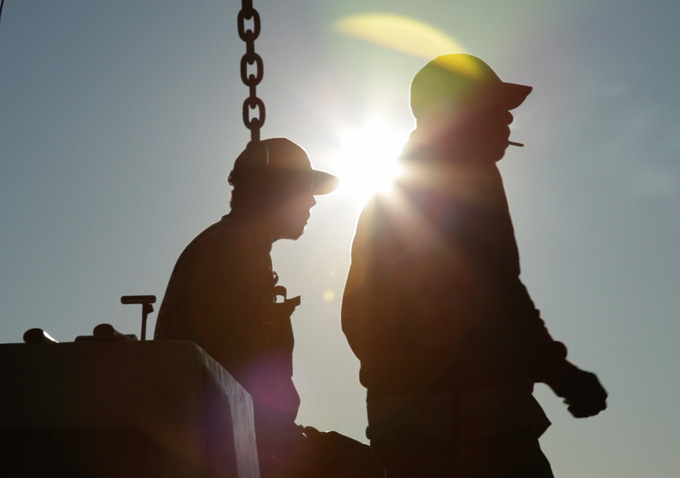
In the aftermath of an environmental disaster, the question usually (and rightfully) turns to the environmental impact, and how the incident will affect wildlife and plants that are in the area. Less considered is the human ecosystem: the lives that exist in conjunction with nature and make a living off the gifts it bestows, while treating it with respect that comes from having been raised on that land. Granted, some disasters don’t have this component, but few seen it to the degree of the Deepwater Horizon oil spill in 2010, that sent an estimated 4.9 million barrels of oil into the Gulf Of Mexico. Four years later, the after-effects of that event are still being seen in the waters and shores from Florida to Louisiana. And one ecosystem ravaged by the destruction of the spill is the fishing community of Pointe à la Hache.
The story of the few hundred residents of the town, located in Plaquemines Parish, is one of struggle. Oyster fishing has long sustained the tiny coastal community, with the fisherman, as generation passed to generation, eventually establishing their own independence after years of sharecropping and institutionalized racism kept them beholden to rich (white) boat owners. This struggle is personified in the Encalade family of Pointe à la Hache, who until the oil spill ran their own company, employed their family and locals, and made enough to send their kids through school. But with not only the oil, but the chemicals used to break it down following the spill, wiping out the very thing that sustained their livelihood, their future is bleak.

Directed by Nailah Jefferson, the documentary “Vanishing Pearls: The Oystermen Of Pointe à la Hache,” picks up in the aftermath of the oil spill, with BP in swift damage control mode, as the government makes a show of coming down hard on the oil company. But reality, as residents of Louisiana know all too well already after watching the botched response to Hurricane Katrina, is often a far different thing from the promises made in front of cameras. Still, when the Gulf Coast Claims Facility comes to residents with $20 billion of BP money to disperse to eligible applicants who have been affected by the spill, it’s not something you can ignore. But it isn’t a total surprise that with BP hiring the lawyer to oversee the fund, one Kenneth Weinberg, and paying his firm $850,000 per month, he may not have the most vested interest in dispersing those funds in a timely manner. It becomes a saga in which, quite simply, BP victimizes people twice.
Creating a context for the oil spill against a backdrop of Louisiana history, the documentary presents not just individuals but a culture and natural landscape that has been drastically changed by the encroaching reach of industry. Not only that, Jefferson puts forth a lineage of injustice of which the Deepwater Horizon incident is just the latest, as the machinations of bureaucracy are activated to slow down claim payments. Indeed, ‘Vanishing Pearls’ is most riveting in its David vs. Goliath story, but at times it is also the film’s weakness. With access to both Weinberg and Dr. Wes Tunnell—who provided a controversial “expert opinion” on the long-term effect of the spill to Weinberg, turning around his report in a mere ten days—one wishes Jefferson had been tougher in her line of questioning. Weinberg and Tunnell made bold decisions which have impacted the lives of the citizens of an entire state in the aftermath of this environmental, ecological and economic disaster. Their feet deserve to be held to the fire a bit more, if only for the incredible accountability they should be carrying on their shoulders.

But ultimately, even for the all history and the thorough approach by the filmmakers, this is a small scale story. This isn’t a tale about the state or even the big city. It zeroes in on the lives of a small group of people, in a tiny corner of Louisiana. And it says something that even with all the archival material, by the one hour mark ‘Vanishing Pearls’ starts to overstay its welcome. Once she establishes the players, Jefferson begins to ring the same notes over and over again, with her documentary threatening to become too insular. And it’s a shame, because with fracking in North Dakota and the Keystone pipeline causing debates on both sides of the border, there will be more of these incidents, and a serious discussion needs to be had about responsibility when something goes wrong, because it will go wrong.
The broader implications of what happens in Pointe à la Hache are suggested but never really explored, and the final third of the movie finds the filmmakers repetitively driving home the points that had been established earlier in the doc. It’s a disappointing finish for a movie that has so much to say about the meeting place of tradition and progress, and the casualties that come as a result of that continued push and pull. But if ‘Vanishing Pearls’ at least starts the conversation, it will be a modest accomplishment. [B-]

